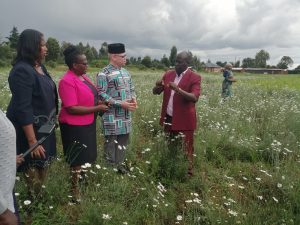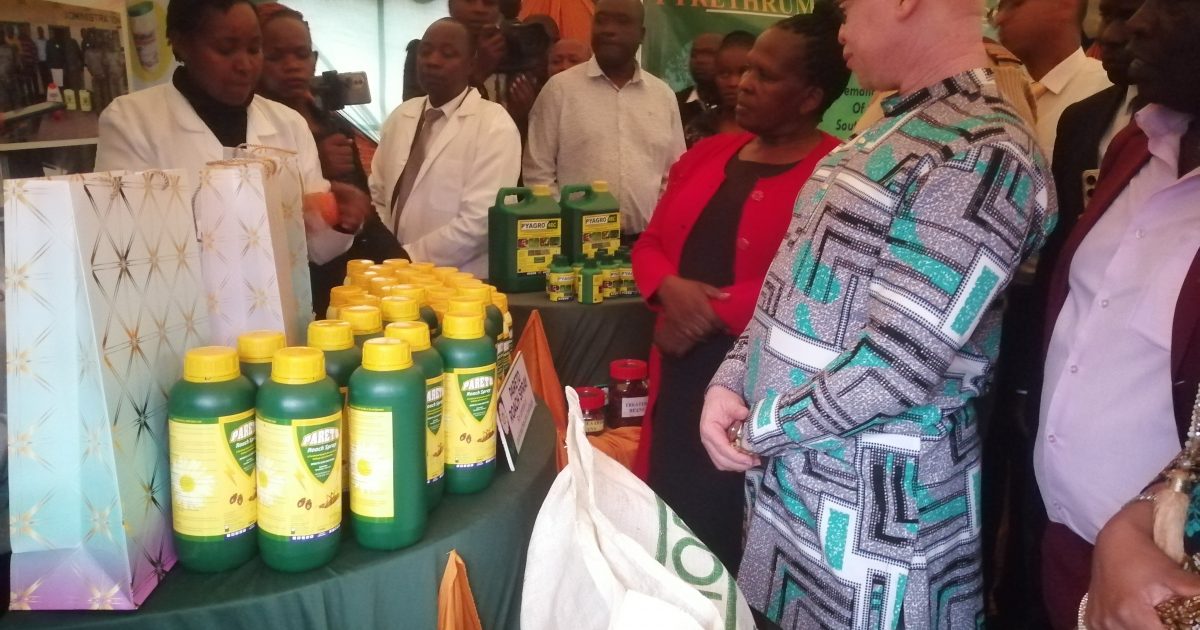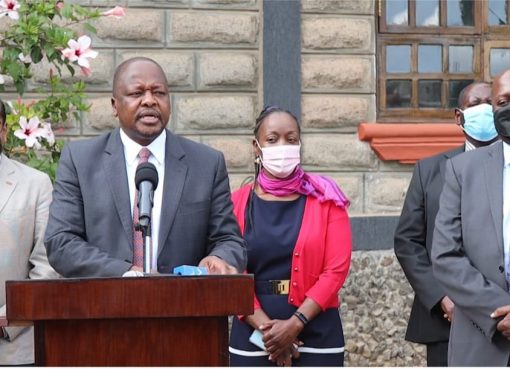Kenya is not giving up on the dream to recapture control of the global pyrethrum market share as the government announced that the sector is coming out of the woods with a revival plan slowly gathering momentum.
The 61-year-old State owned Pyrethrum Processing Company of Kenya (PPCK) in Nakuru has been one of the focal points in this revival plan with Government Spokesman Dr Isaac Mwaura announcing a plan to pump Sh450 million towards upgrading the facility’s extraction plant.
The sector used to offer livelihood to thousands of small-scale growers before the industry started reeling under huge debts due to years of mismanagement, theft and underfunding by the exchequer.
The Spokesman indicated the government is targeting to boost pyrethrum growing by ensuring that at least 30,000 acres of land is put under the crop and having 200,000 farmers embrace the crop in the country by 2027.
Currently the cash crop that was regarded as the ‘black gold’ and was the third largest foreign exchange earner with the government pocketing in excess of Sh18 billion annually during a good harvest covers 8,000 acres.
According to Dr. Mwaura, though pyrethrum earned Kenya Sh72 million last year, Kenya has a potential of netting Sh9 billion from the cash crop if the sector is brought back to its feet.
Other strategies, Dr Mwaura said, include provision and distribution of enough quality seedlings to farmers and increasing capacity of the pyrethrum processing plant.
Speaking during a media briefing after touring the PPCK extraction plant Dr Mwaura indicated that the State in partnership with the 19 pyrethrum growing counties, is working to ensure full revival of the cash crop’s production by providing the necessary resources and incentives.
“What we are doing is a show of commitment by the government to revive pyrethrum growing. We have just started and by next year we want to have at least 30,000 acres put under pyrethrum,” said Dr Mwaura.
The State, he said, has also reconstituted the PPCK Board of Directors. The industry operated without a substantive board for more than 15 years.
He said the presence of a board is an assurance that there will be proper governance.
The Spokesman emphasized the need for competition in the sector which will ensure farmers get the best prices when selling their produce.
He thus indicated that the government was encouraging private investors to join the sector, saying it will eliminate monopoly which, he said, was the main reason for the collapse of the sub-sector.
Dr Mwaura pointed out as part of a strategy to motivate more farmers to embrace the crop PPCK now offers free seedlings and this has increased acreage under pyrethrum.
He said PPCK has increased production of clean planting material by over 90 percent and revived its nursery.
The firm has also contracted tissue culture propagators and provided them with genetically clean material for multiplication.
The spokesman indicated that the government was also encouraging private investors to set up commercial nurseries.
“PPCK fully supports farmers. An acre takes about 22,000 seedlings, which cost over Sh 60,000. PPCK has taken that burden from growers. The Ministry of Agriculture has also distributed 15,000 tons of quality pyrethrum planting material,” he explained.
Towards enhancing its Own Source Revenue (OSR) Dr Mwaura said PPCK has set up its value addition production lines for by products such as pymark which is sold as animal feed, pygrese used to contain ticks and tsetse flies and pygro which is used to make pesticides. With this business model PPCK is making 10 percent more than it used to.
He said PPCK which was now receiving 30 tons of dry flowers per month was now paying farmers promptly after governance issues were addressed, adding that they were receiving between Sh250 t0 Sh750 per kilo delivered depending on the pyrethrin content.
Dr Mwaura assured Pensioners of PPCK that plans were underway by a receiver manager to settle their Sh2.5 billion pension arrears.
The collapse of the pension scheme, which was once the best run in the country, has left the 327 members without their pension for over 12 years
The scheme began its downturn in 2002 when the then Pyrethrum Board of Kenya (PBK) started experiencing financial challenges linked to mismanagement, corruption and theft of its resources.
At its production peak, there were more than 220,000 pyrethrum farmers who were harvesting between 7,000 and 12,000 tonnes of the crop per year.
In the 1990s, Kenya controlled over 75 per cent of the world’s pyrethrum market. Today, Kenya’s share of the market has plummeted to just two per cent.
Production of pyrethrum in the country has since declined from a high of 18,000 tons in 1992 to the current national production of about 500 tons per year.
Pyrethrin is often used in household insecticides and products to control insects on pets or livestock.
Pyrethrum, a broad-spectrum insecticide, affects a wide range of insects in gardens or farms. Experimental planting of pyrethrum in Kenya started in 1926 and the first few tonnes were exported six years later.
Dr Mwaura admitted that the crop earned farmers a lot of money between 1970s and 1990s.
“It was a very profitable crop. There was a bit of mismanagement, farmers were not paid and they lost hope. Because the buyer was only one, they had no choice,” he said.
Countries like Rwanda, he said, poached investors to go set up industry there, leaving the Kenyan industry a shell for years.
PPCK Acting Chief Executive Officer Ms Mary Ontiri said demand for Kenya’s pyrethrum is still very high on the global market.
She observed that the European Union and United States are keen on chemicals sprayed on horticultural crops entering their markets and the local pyrethrum has a ready market owing to its high quality and low chemical use.
Both European and American markets consume 80 percent of Kenyan pyrethrum
Ms Ontiri said with the board, they are working closely with the stakeholders in pyrethrum growing counties to revive the sector fully.
She said they have also increased the price, as initially they purchased a kilogram at Sh100.
PPCK, she said, has come up with value addition instead of selling raw products to international markets.
She added that PPCK targets to process close to 100 tonnes by the end of this year.
“From last year when farmers heard that there was a board, flowers started flowing in and we processed 50 tonnes within three months. Between now and December, being the peak period, we will get more than 100 tonnes,” she affirmed.
The CEO said the Sh305 million extraction plant bought and installed in 2006 is still intact and added that for it to run optimally, they will require 50 tonnes of flowers every day.
Currently, the country controls a paltry one per cent of the global market share, down from the 80 per cent it had and which has since been taken over by Australia and other Eastern Africa countries.
The sector went on its knees in the 1990s as the Pyrethrum Board of Kenya (PBK), now PPCK, was unable to pay farmers on time, forcing them to uproot the crop. PBK enjoyed monopoly then.
In 2010, Parliament liberalized the sector, allowing for private processors to enter into the market and break the PBK monopoly.
Efforts to revive the sector began in 2003 when former President Mwai Kibaki’s administration gave PBK a Sh803 million loan to pay farmers debts accrued between 2001 and 2003.
In 2013, the former president signed the Pyrethrum Amendment Bill of 2011 into law, liberalizing the sector with hopes that bringing on board private processors would help get it back on track.
Board Member Mr Justus Monda indicated that they are making sure sufficient land is available in pyrethrum growing zones of Molo, Kuresoi South, Kuresoi North and Njoro Sub-Counties to enable PPCK and other private sector actors to set up crop nurseries in a plan aimed at lessening the burden of sourcing for seedlings from other regions.
The nurseries will grow the developed Nakuru Region Pyrethrum Clone that is disease resistant and has higher pyrethrin content.
He asked farmers to embrace pyrethrum farming as it will earn them millions of shillings since it is harvested every three months.
“The crop does not need a lot of land. We are in a new dispensation as far as pyrethrum farming is concerned and I urge as many farmers as possible to embrace the crop,” Monda said.
The pyrethrin content per kilo in Nakuru ranges from 1.4 to 1.8 per cent which is likely to increase as farmers grow better quality seedlings.
“We are happy that the sector has picked up and we shall continue to support farmers through the provision of seedlings, processors and a market for their produce,” he said.
Mr Monda indicated that the PPCK was working with the Ministry of Agriculture, the county government, research institutions and other stakeholders as part of the strategies to fully revive pyrethrum growing.

He further said the strategy is to facilitate provision and distribution of enough quality seedlings to farmers to increase the capacity of the pyrethrum processing plant.
He stated that they were closely working with the Kenya Plant Health Inspectorate Service to ensure the seeds supplied to farmers are certified and suitable for planting in specific areas.
Mr Monda indicated that dedicating more land towards growing the crop was the surest way to increase production and assured farmers of getting good returns as pyrethrum had high demand globally.
He said due to the global shift from synthetic to natural pesticides, pyrethrum farmers in Kenya stand to gain more if they improve production.
Pyrethrum is grown in 18 counties with Nakuru, Nyandarua and West Pokot emerging as the main producers of the cash crop that was once christened ‘White gold of Kenya.’
Pyrethrins are often used in household insecticides and products to control insects on pets or livestock.
Pyrethrum, a broad-spectrum insecticide, affects a wide range of insects in gardens or farms.
The crop is also grown in Uasin Gishu, Kericho, Kisii, Kiambu, Narok, Nyamira, Nyeri, Baringo, Nandi, Meru, Embu and Murang’a, among other counties.
Agriculture and Food Authority (AFA) data shows that between 2018 and 2022, while land under pyrethrum farming dropped from more than 6,000 acres to 4,000 acres, the price of the flowers delivered by farmers at factories increased from Sh151.9 per kilogramme to Sh250 for the same quantity following a steady increase.
“In the period under review (2022), the total acreage under the crop was 4,000 acres, an increase of 223 acres from 3,777 acres recorded in 2021. The increase in acreage was as a result of government support in the purchase and distribution of seedling programme in the pyrethrum growing counties as well as favourable climatic conditions,” AFA notes in its 2023 yearbook of statistics.
Nakuru, Nyandarua and West Pokot counties lead in the farming of pyrethrum, with more than two-thirds of the land under the cash crop in the country being in the three counties.
“Nakuru County had the largest percentage of area under pyrethrum at 29.9 percent followed by Nyandarua and West Pokot at 19.6 and 17.7 percent respectively,” AFA noted.
Between 2018 and 2022, farmers delivered 2.2 million kilograms of pyrethrum dry flowers, valued at Sh496 million. Two-thirds of the flowers valued at 69 percent of the Sh496 million were, however, delivered in 2021 and 2022 alone.
This shows the growing value of the crop, which has seen dry flower prices increase by two-thirds over the period.
“Pyrethrum dry flowers delivered increased by 88.2 percent from 500,564 Kgs in 2021 to 941,872 Kgs in 2022 attributed to planting material distribution efforts by the county governments, processors, individual propagators, interfarm and other industry stakeholders,” the AFA report says.
“The value of dry flowers increased from Sh106.7 million in 2021 to Sh235.4 million in 2022 attributed to an increase in average farmgate prices from Sh213/kg to Sh250/kg.
By Anne Mwale





